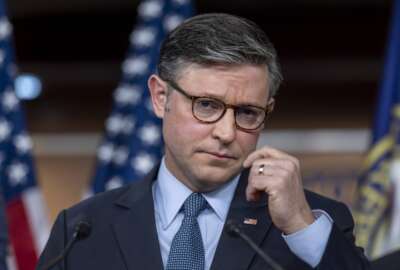DHS issues shutdown guidance to its employees
While it's unclear whether Congress will approve another continuing resolution or full-year funding for the Homeland Security Department after this Friday, DHS has...
Congress gave the Homeland Security Department a temporary reprieve from a shutdown late Friday, when it passed a one-week continuing resolution to keep the agency funded through March 6.
But, DHS employees are still on the shutdown roller coaster, wondering whether they’ll be furloughed if Congress fails to pass another CR or full-year appropriations by midnight Friday.
While we don’t know what Congress will do this week, we do know how DHS will be handling the shutdown if one occurs.
Last Friday, the agency issued a set of procedures it will follow in the event of a lapse of appropriations. It’s simliar to the guidance DHS issued to employees prior to the October 2013 governmentwide shutdown.
To avoid confusion over which employees are performing “essential” or “non- essential” work, DHS decided to classify its activities as either “exempt” or “non-exempt” functions. Employees performing work considered “exempt” will not be furloughed. Everyone else will be consider “non-exempt” and therefore eligible to be furloughed.
Exempt (non-furloughed) activities include those performing functions that are funded by sources other than appropriated funds, such as activities that are funded through fee revenues or by multi-year, no-year or revolving funds or advance appropriations.
“Agencies may continue to incur obligations and disburse funds from such non- lapsed funding sources,” the guidance said. “Revolving funds that operate almost entirely on offsetting collections from other federal entities may also be forced to close, unless sufficient retained earnings are available to forestall the closure. Employees paid directly from a funding source that has not lapsed during a lapse in appropriations will continue to perform normal duties and will continue to receive pay during the lapse.”
| Total Employees: On-Board vs. Exempt | ||
| DHS Component | Total Employees On-Board 12/31/14 |
Total Exempt Employees |
| OSEM | 588 | 81 |
| USM | 2,021 | 239 |
| A&O | 794 | 381 |
| OIG | 668 | 352 |
| CBP | 59,546 | 53,288 |
| ICE | 18,765 | 15,073 |
| TSA | 55,791 | 52,604 |
| USCG | 48,261 | 42,147 |
| USSS | 6,336 | 5,818 |
| NPPD | 3,064 | 1,748 |
| OHA | 86 | 34 |
| FEMA | 14,024 | 9,684 |
| USCIS | 13,451 | 13,099 |
| FLETC | 1,039 | 68 |
| S&T | 462 | 26 |
| DNDO | 121 | 7 |
| TOTALS | 225,017 | 194,649 |
DHS activities falling in this category include the Disaster Relief Fund and the U.S. Citizenship and Immigration Services.
Activities funded by the DHS Working Capital Fund (WCF), however, are non- exempt because they require authorization via annual appropriations to continue operating.
Other exempt categories include activities:
- Authorized under Law to Continue Even without Funding;
- Implied by Law as Necessary to Continue Even without Funding;
- Necessary to the Discharge of the President’s Constitutional Duties and Powers;
- Necessary for Safety of Human Life or Protection of Property;
- Necessary for the Orderly Cessation of Functions.
“Non-exempt activities are all other activities that do not fall into any other categories,” the guidance said. “Employees in positions performing these functions should be furloughed during a lapse in appropriations. This could include employees who may have to be recalled at a later date, if the furlough continues for more than a week.”
Examples of this type of non-exempt (furloughed) activities include planning, research and development, policy and administration, auditing, regulatory and training.
“Non-exempt employees will receive pay for performing shutdown activities following enactment of an appropriations bill or a Continuing Resolution permitting such payments,” the guidance said. “Exempt employees whose salaries are funded by other than annual appropriations should continue to receive pay as regularly scheduled. Human resource organizations must also be prepared to respond in the event legislation is enacted during the lapse that permits some exempt employees such as military personnel to continue to receive pay.”
The guidance also provided some insight on which DHS components are most affected by the possible shutdown. (See chart).
“Once OMB notifies DHS that a lapse in appropriations has commenced, non- exempt employees may use their DHS-issued electronic devices, such as BlackBerry, TREO, or mobi-key to receive furlough notices, acknowledge delivery receipt and read receipt of furlough notices, and acknowledge receipt of notices via return email,” the guidance said.
Non-exempt employees can continue to use their electronic devices to check for emergency notifications from their supervisors or management, but any other use is prohibited.
“Failure to follow this policy may result in a violation of law, specifically the ADA ( Anti-Deficiency Act), which has a criminal component, and may result in severe penalties,” the guidance said.
RELATED STORIES:
Boehner leaves open possible vote on Dem-backed DHS bill
Earth to House GOP: Messing with DHS ain’t governing
Copyright © 2024 Federal News Network. All rights reserved. This website is not intended for users located within the European Economic Area.
Michael O’Connell is senior digital editor of Federal News Network optimizing content for the best user experience. Follow @moconnellWFED
Follow @moconnellWFED






